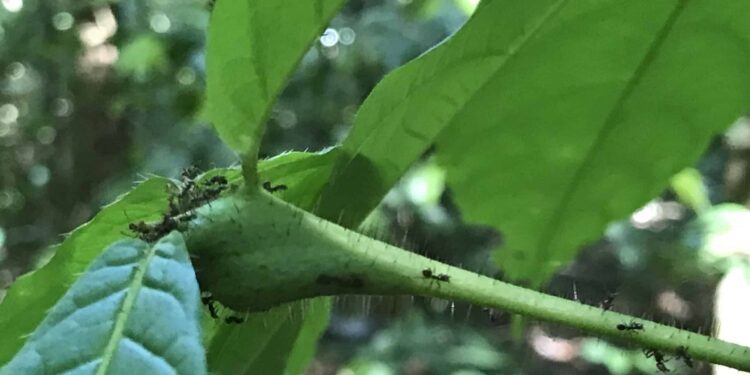Forest ants patrol their Cordia factory. Forest ants were better able to defend their plant habitat than urban ants. Credit: Elsa Youngsteadt, NC State University.
A new study from North Carolina State University finds that climate change could destabilize mutualistic relationships between insects and plants. The results, published in the journal Ecologycould portend a future breakdown in the symbiotic relationships that underpin healthy ecosystems.
In the South American study, researchers from North Carolina and Peru examined the beneficial relationship between certain species of ants and tropical shrubs (Cordia nodosa) that house the ants in exchange for defense against phytophagous pests.
The researchers compared the mutualistic relationships between these tropical shrubs and ants in five urban and five protected forest sites to understand how they differed. Particular attention was paid to the different species of ants living in the hollow parts of shrubs and their tolerance to heat, a typical characteristic of urban environments.
The results showed that urban plants were not well defended by their ants, which were mostly opportunistic ants that are not normally associated with C. nodosa plants.
However, ants specialized in this beneficial relationship were still associated with C. nodosa plants in forests.
The opportunistic urban ants lived up to their description, generally refusing to come to the plant’s aid when threatened with the flick of a finger from one of the researchers. Mutualistic ants in forest areas were 13 times more likely to respond to a threat – an expected result.
Unexpectedly, urban plants were not decimated without their usual protective ants. Herbivory was relatively low in urban areas.
“I think the herbivores themselves probably don’t do very well in the city, whether it’s because of habitat fragmentation, temperature or whatever is keeping these specialist ants out, it can also keep herbivores out,” said Elsa Youngsteadt, associate professor of applied ecology. at NC State and corresponding author of a paper describing the research. “It’s also possible that urban plants have strengthened their defenses in other ways.”
Meanwhile, in forests, plants without their protective ants had higher rates of herbivory – a more expected result.
Youngsteadt added that the research showed a clear urban heat island effect: urban areas were about 1.6 degrees Celsius warmer than forested areas. It also showed that urban ants were, overall, more heat tolerant than forest ants.
“While this study provides a small glimpse into what we can expect in the future with global change, many questions remain unanswered,” said Sara Prado, co-author of the paper and adjunct assistant professor of ecology applied to NC. State.
“If urban plants do not need ants to protect them, will their colonization by these opportunistic ants have harmful effects? What is happening with herbivores? If these changes also occur in forests in the future, we may see other examples of specialized mutualistic interactions changing or disappearing altogether.
More information:
Elsa Youngsteadt et al, Urbanization leads to partner change and loss of mutualism in an ant-plant symbiosis, Ecology (2024). DOI: 10.1002/ecy.4449
Provided by North Carolina State University
Quote: Study on ant-plant symbiosis reveals that climate change could destabilize mutualistic relationships (October 14, 2024) retrieved October 14, 2024 from
This document is subject to copyright. Except for fair use for private study or research purposes, no part may be reproduced without written permission. The content is provided for informational purposes only.



